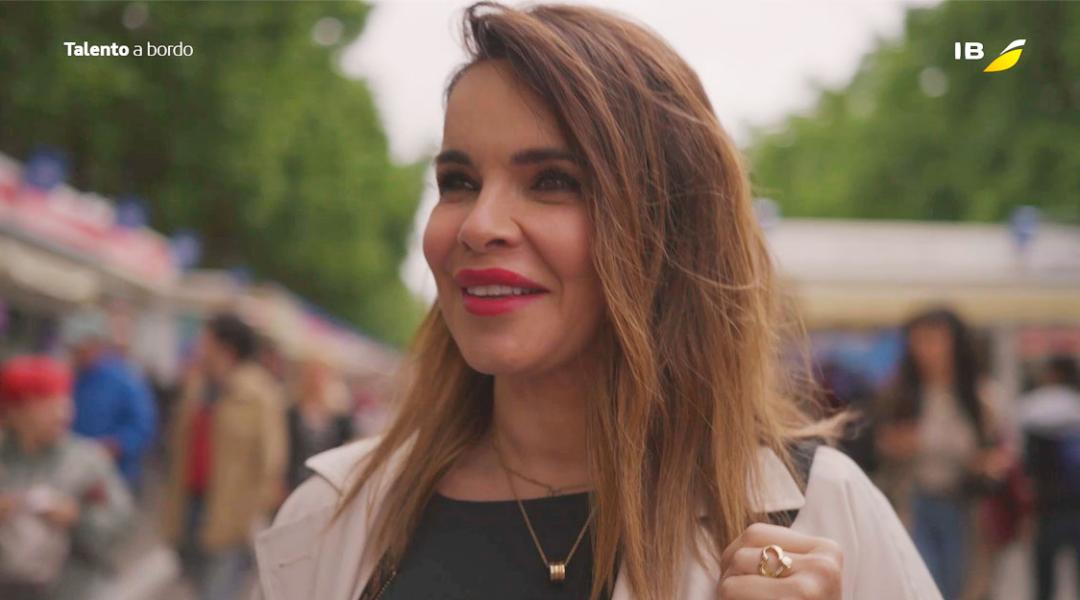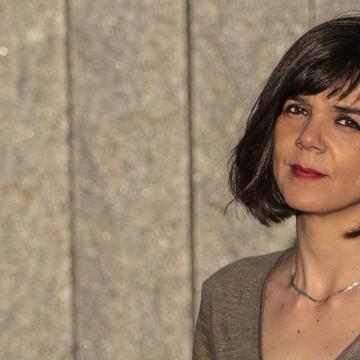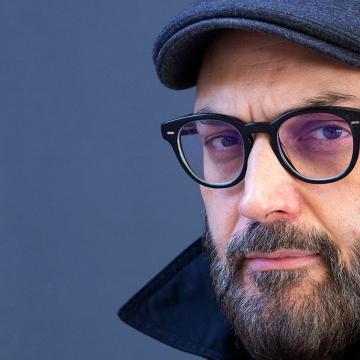Since opening on the 17th of April, Espacio Iberia has welcomed dozens of guests with one thing in common: their infinite talent. Talent that has inspired all the people who have sat there to listen to them.

This journalist and writer —or storyteller as she defines herself— Carme Chaparro remembers walking around on Sant Jordi [Saint George’s Day] with a backpack full of books for her idols to sign. Today, she’s the one doing the signing. ‘Delito’, her latest novel, has become a bestseller and we spend a morning with her at the Madrid Book Fair chatting about literature and journalism, of course.
“It’s taken me years to believe that I can sign as a journalist and writer,” Carme Chaparro (Salamanca, 1973), journalist and writer, obviously, assures us. Just spending a morning with her at the Madrid Book Fair, an event sponsored by Iberia, is enough to realise her impact on readers. As it happens, the day before our meeting she ended up signing copies of her new novel, Delito, on a bench in El Retiro Park. “There were still people standing in line and I didn’t want anyone to go home without their signed copy,” she remembers, overwhelmed. Carmen is deeply grateful to her readers: “I’m honoured that they let me into their homes and their lives, into their souls. Each story they tell me is a gift.”
“I’m honoured that they let me into their homes and their lives, into their souls. Each story they tell me is a gift”
Her first novel, No soy un monstruo, won her the Premio Primavera de Novela, the recognition she needed to continue moving forward in the literary world. Then came La química del odio and No decepciones a tu padre, making up the trilogy featuring inspector Ana Arén. In Delito, Carme takes a turn and sets this character aside. “I stop believing in characters when too many things happen to them, and I didn’t want that to happen with Ana —she confesses—. I also wanted to write in a male voice and see if I could step out of that literary universe.” Based on the success of Delito among the public, mission accomplished.
Readers connect with Carme’s stories, perhaps because they are written with their sights set on reality. “My novels feature a lot of social commentary, about what happens on the streets in Spain, how people live and breathe; in short, a lot of truth.” As she herself admits, it’s impossible to separate her writing from her journalism: “My writing cannot be understood without my journalistic side. In fact, the narrative techniques I’ve learnt in the TV industry are present in my novels, which are really visual. When I’m asked about my profession and I don’t want to give the long answer of presenter, journalist and writer, I say: storyteller.”
“When I’m asked about my profession and I don’t want to give the long answer of presenter, journalist and writer, I say: storyteller”
And where does that passion for telling stories through literature come from? “Literature has always been with me. I’m an avid reader and can’t imagine my life without books. In fact, they’ve been a refuge during difficult years.” Beyond being a writer, Carme is still a reader, and is quick to say hi to Julia Navarro when she spots her signing books. “I still have that reader’s innocence of being on the other side —she admits—, but I’m also getting used to the idea that I’ve also become a writer who is admired by readers.” Carme, who’s also used to dealing with TV audiences, explains that the connection is different. “Readers have a more intimate connection with you. For TV audiences, you’re someone who keeps them company at home on the sofa, but for readers, you’re someone who keeps their heart, their soul, company.”
We can’t leave Carme without talking about the loss of prestige journalism is suffering, a world she’s been working in for almost three decades. “Journalism is needed now more than ever, but we must work honestly, separating journalism from mere spectacle. If we achieve this, journalism will survive as a profession. The loss of journalism would be dangerous to society.” The honesty Carme demands blends into a firm commitment to women and feminism in her case, which won her the Observatory Award against Domestic and Gender-based Violence in 2018. “How could I not be a feminist? —asks herself—. Feminism means equal opportunities.”
“Talent is what we know how to do, but also our dreams. And talent is our way of pursuing them and never giving up”
Finally, we leave Carme alongside her dear readers. She starts signing at midday and is still receiving them with open arms two hours later. “You need to ask them and take note of their stories, because you learn things for your books, but also for life. Each reader gives me a feeling, a lesson.” It seems that Carme’s dream is coming true and, precisely her view of talent is closely related: “Talent is what we know how to do, but also our dreams, who we want to be. And talent is our way of pursuing them and never giving up.”


